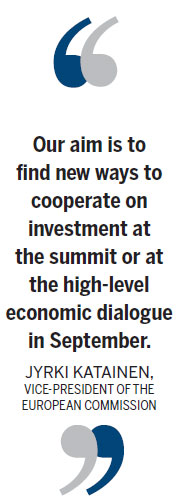Easy answer for European job creation
Updated: 2015-06-26 06:35
By Liu Jia(China Daily Europe)
|
|||||||||||
An open door for Chinese investment and investors is likely to be a primary topic for the upcoming EU-China Summit in Brussels
China can make significant job contributions in Europe, according to a top official of the European Commission, the executive body of the European Union.
Jyrki Katainen, vice-president of the commission and commissioner for jobs, growth, investment and competitiveness, spoke about China on the eve of the EU-China Summit in Brussels on June 29.

Katainen calls it amazing that Chinese tech giant Huawei has created almost 10,000 local jobs in Europe over the past decade. It shows the company has found a good business environment in Europe, which is keen on competition and competitiveness, he says.
But despite rising Chinese investment, China still represents only a modest portion of the total foreign investment in Europe.
"There's still plenty of room for improvement," Katainen says, "and China can make a significant job contribution in Europe."
Despite unemployment rates in April falling in 22 of the 28 European Union member states, it is estimated by Eurostat that close to 10 percent of the population is still jobless.
Stimulating investment in Europe is a crucial step for creating more jobs. A report issued in March by investment bank China International Capital Corp and Baker & McKenzie, a multinational law firm founded in Chicago in 1949, shows Chinese foreign direct investment into Europe is at record levels.
With 153 separate investments worth $18 billion last year, Europe has emerged as one of the top destinations for Chinese foreign investment globally, the report says.
Katainen, in the context of hunting for more investment from both sides, says the EU-China Summit comes at the right time. The EU's helmsman for investments and jobs expects exploration of new approaches to boost investments mutually and to broaden collaboration with China.
"Our aim is to find new ways to cooperate on investment at the summit or at the high-level economic dialogue in September," says Katainen, who will travel with Commission President Jean-Claude Juncker to Beijing in September as one among six or seven EU commissioners in the delegation.
"Those are the key events at which we can create something new as the outcome," he says, stressing the EU's willingness to exchange views with China.

One of the possibilities is to connect the EU's investment plan with China's Belt and Road Initiative, he says.
He sees the Brussels summit as a good place to talk with Chinese Premier Li Keqiang, pointing out that EU officials need to further discuss with China how Europe can participate more in the initiatives, and also how China can get more involved in the EU's investment scheme.
The newly established European Fund for Strategic Investments, as a part of Juncker's 315-billion-euro investment plan, will focus on supporting economic growth, job creation and stimulating recovery across Europe by financing higher risk private projects in particular.
"Member states together will set up investment platforms, which can be called regional funds," he says.
"Those platforms either contain cross-border projects between the different European countries or specifically concentrate on some thematic areas such as energy, digital economy or infrastructure, and are open for external investors to participate.
"Apart from the regional platforms open for third countries' contributions, EFSI, the new risk fund itself is also open for external investors."
Katainen says these new platforms could be a new choice for Chinese investors. With 60 billion euros in financing capacity in three years, Katainen says, the new fund will significantly promote growth and employment through the release of investment potential in the private sector.
According to a report issued by the International Labour Organization, more than 2.1 million new jobs could be generated by mid-2018 under the three-year investment plan.
"In order to make a significant dent in unemployment, the plan must first include a significant portion of private investment, especially among job-rich small enterprises," the report says. "And second, it should address the wide disparities in unemployment that exist across the EU, so that economies with greater need can benefit from the fund."
In the absence of these two conditions, the plan will make little or no difference to the EU employment outlook, the ILO report warns.
As a result, private investment from third parties outside the bloc can play a vital role, too, in terms of mid- to long-term job creation in Europe.
Katainen says the EU aims to widen and deepen its internal single market. It plans to remove obstacles that can pose hurdles for foreign SMEs and multinationals seeking to enter the EU internal market. In the meantime, member states will carry on domestic reforms and enhance their national competitiveness and attractiveness.
Sharing the aim of attracting more foreign investors, several EU member states including Portugal, Spain, Cyprus, Hungary and Latvia have launched the so-called golden visa program. The mechanism offers third-country nationals a residence permit to conduct investment activities with a visa waiver to enter national territories.
Chinese investors top the list of applications.
In Portugal, more than 80 percent of the total golden residence permits have been granted to Chinese business applicants, according to Antonio Maria Ferrari, adviser on the cabinet of the Portuguese economic minister.
The number of UK visas issued in China also hit a record high of more than 400,000 last year. China has replaced India as the largest country in terms of the annual quantity of British visa applications, British Ambassador to China Barbara Woodward said in March.
The UK and Ireland have introduced a new scheme that will allow Chinese and Indian nationals who hold either a UK visit visa, or an Irish visa, to visit both countries on the same visa.
On June 19, the British and Belgian governments announced a joint visa partnership specifically targeting Chinese applicants.
Under the new UK-Belgium pilot scheme, the visa application process will be further streamlined. From July 1, Chinese visitors to the UK and Belgium will be able to obtain a travel permit for Britain, Belgium and Schengen Area countries via one single visit to the visa application center in Beijing, Guangzhou or Shanghai.
Such a one-stop shop will allow Chinese tourists and businesspeople to visit 26 European countries within the Schengen zone, as well as Britain and Ireland, two non-Schengen destinations, all through one visa.
Though committed to immigration control, Britain, the top pick for Chinese investors within the 28-member EU bloc, is constantly seeking alternatives to pave the way for Chinese visitors with more and easier mobility.
With the domestic jobless rate falling to 5.5 percent while wages grow by about 4 percent a year, British Prime Minister David Cameron tags his country "the job factory of Europe".
According to the Office of National Statistics, employment in the UK has grown by 564,000 over the past year and an additional 202,000 jobs were created in the first quarter of 2015.
Easier visa norms will not only create more local businesses but also may get more potential investors on board, which can lead to more job creation.
Belgium is ready for a big increase in the number of visits from China, too. In addition to the increasing frequency of direct flights, the country's biggest cargo airport, in Liege, is now receiving charter flights from three Chinese cities every week.
Other top Chinese investment and tourism destinations such as France, Germany, the Netherlands and Italy all have eased visa rules for Chinese applicants by shortening and simplifying the application procedures in the past year.
However, Li is likely to negotiate for even easier visa access during his visit to Belgium, EU headquarters, France and the Organization for Economic Cooperation and Development headquarters starting on June 28.
An open door for Chinese visitors is expected to bring in more investment, especially private investment, to Europe, and boost job creation in the continent as well.
For China Daily
( China Daily European Weekly 06/26/2015 page8)
Today's Top News
Netizens stunned by end of Liu Xiang's 290-day marriage
Hollande urges Obama to stop espionage on allies
FM: Chinese visitors enjoy better visa policies
US Supreme Court upholds Obamacare
Greenhouse-cuts bill 'could reach 41 trillion yuan'
British queen may have to move out of Buckingham Palace
NSA eavesdropped on last three French presidents
BOC denies illegal activity in Italy
Hot Topics
Lunar probe , China growth forecasts, Emission rules get tougher, China seen through 'colored lens', International board,
Editor's Picks

|

|

|

|

|

|






